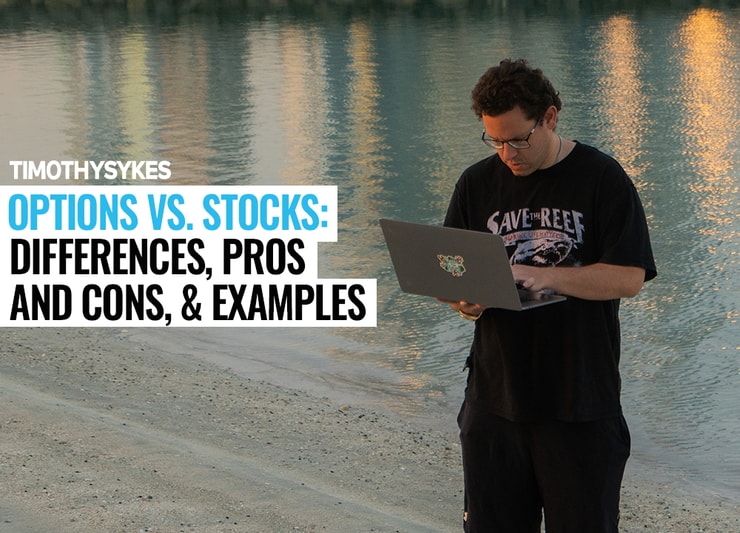Options vs. Stocks: Key Takeaways
- See what makes options different from stocks…
- Check out examples of how options trades can play out…
- Learn from my student who’s made insane money trading options!
See How This Millionaire Trader Uses Penny Stock Patterns For Options AND His $100K Shortcut
One of my earliest Challenge students, Mark Croock, applies penny stock strategies to options.
So even though I don’t trade options, I want you to see what’s possible in the markets. That’s why I started my Trading Challenge…
I want traders to become self-sufficient and learn what works for them. So what do you need to know about trading options vs. stocks? And what can you learn from Mark? Let’s get to it.
Table of Contents
- 1 How Are Options Different From Stocks?
- 2 Options vs. Stocks: Examples
- 3 Options vs. Stocks: Which Should You Choose?
- 4 Can I Trade Stocks and Options?
- 5 Frequently Asked Questions About Options vs. Stocks
- 6 Is Trading Options a Good Idea?
- 7 Are Options Better Than Stocks?
- 8 When Should You Buy Options Instead of Stocks?
- 9 Can You Lose More Than You Invest in Options?
- 10 Where Are the Best Places to Trade Options?
- 11 The Bottom Line: Options vs. Stocks
How Are Options Different From Stocks?

We’re talking about stock options vs. actual stock ownership. Options are derivatives — financial instruments that have no value on their own. The right to buy or sell the underlying stocks gives options their value.
There’s more to the options vs. stocks discussion…
But I want to focus on why YOU should trade options vs. stocks.
You know how I always say trading is a battlefield?
Well, options trading is really a battlefield. It’s a zero-sum game. Either you or the buyer (or seller) will lose.
The market’s determined by the balance of supply and demand. There are always winners and losers.
But sometimes stock transactions are win-win. Maybe the seller makes a profit they’re happy with, and the buyer does too.
It’s a bit different for options traders. The advantage of buying options vs. stocks is that you get to see the result before you own the stock.
Stocks

Let me be clear — I’m in no way advising you on when to buy options vs. stocks. I don’t trade options. I’ve made $7.3 million trading penny stocks.
Stocks, for me, are simple. People can complicate trading in a lot of ways. To me, that just raises the barrier to entry.
When traders get caught up in complex technical analysis, they can miss a basic truth…
Only price pays.
This is why I teach simple patterns to my Trading Challenge students. I still use my 7-step pennystocking framework for a good reason…
It still works.
Now more than ever, small account traders have a place in the market. And you can increase your odds by building your knowledge account.
You’re getting a small taste of my teaching approach with this article. If you want to build your knowledge account, I encourage you to join my Trading Challenge. But know that I’ll ask a lot of you.
Apply to the Trading Challenge today — only if you’re truly willing to put in the hard work it takes! My team and I don’t accept everybody.
Options

If you want to trade options, there’s a lot to learn.
For now, I’ll do my best to keep this simple. There are two basic types of stock options — call vs. put.
Call options give you the right, but not the obligation, to buy a stock at a specified price. Put options are the sell side of the equation.
This preset price is called the strike price. If the stock goes up by the end of your option term, a call option lets you buy the stock at the strike price. A put option lets you sell a devalued stock at the strike price.
Sounds like a good deal, right? So what’s the catch?
Every options contract has a premium attached to it. This is the non-refundable amount that the options seller receives.
There’s also an expiration date on the option and a lot of other considerations…
When you get into day trading options vs. stocks there’s a lot more to know.
If you’re getting your options vs. stocks ideas from Reddit, I want to add some caution to the mix.
A lot of traders treat options like lottery tickets. If the bet’s right, you collect. If not, try again.
This is the opposite of my approach to trading. I want you to go for singles and limit your risk.
Option premiums often exceed what I think of as acceptable risk. Sexier options can either bring big profits or loss of the original investment…
To me, that’s a hard way to build a good trading strategy.
Options vs. Stocks: Examples

Let’s say stock XYZ is trading at $13…
Want to buy or short it? The price is $13. Whenever you want, you can exit the trade.
Yes, there are a lot of things you should know going in, like whether the stock is liquid enough to exit when you want to…
But at its most basic, trading stocks is relatively easy. Options trading can be much more complicated.
To price an options contract premium, you’ll need to set a strike price and expiration date. The stock’s volatility also affects the premium.
So say your target stock is trading at $13.09. You set the strike price at $13 — this is called an in-the-money option.
You could sell it immediately and make 9 cents per share … But that’s not a great idea if the premium costs you 57 cents per share.
You could tinker with the strike price, sending it further out of the money. But doing so will likely reduce your chances of making a profit.
Options vs. Stocks: Which Should You Choose?

When you’re deciding on a trading strategy, look at your trading journal to see where you excel. If you’re choosing to focus on options vs. stocks, look at your track record with each strategy.
For me the choice is obvious — I love trading penny stocks. That’s my go-to niche. But the reason I teach isn’t to create clones of me…
I teach so my students have the tools to become the traders they want to be.
I want you to make this decision for yourself … So for this next section, I want you to learn more about top Challenge trader and mentor Mark Croock.
More Breaking News
- Eightco Holdings Stuns Market with New Financial Moves: Is a Stock Rebound on the Horizon?
- Opendoor Technologies: Navigating Volatility Amid Executive Share Sales
- Coinbase Faces Market Challenges Amid Cryptocurrency Decline
The Best Options Trader I Know

As I mentioned, Mark has taken my penny stock patterns and adapted them to options trading. He’s developed a program to teach his strategy called Evolved Trader.
He’s made over $3.2 million so far, mostly trading options.
He might have made his millions in a different way than I did, but I think he did it the right way…
Just like me, he believes that small gains add up. It took him 10 years to get to where he is now … That’s proof of his patience, ability to adapt, and his strategy working over the long term!
Too many options traders think you should go big or go home. With this approach, they mostly go home.
It takes REAL DISCIPLINE to keep greed and emotions out of your trading plan. Mark has learned this, to a fault.
See this post to learn more about how Mark evolved his trading style.
These days Mark teaches in my Trading Challenge and runs his Evolved Trader program. He made over $1.2 million in 2020. This year, as of this writing, he’s made over $650,000 in profits.
Why trade options instead of stocks? If you want the best argument I’ve heard, check out Mark’s $100K Shortcut here.
Pros and Cons of Trading Stocks

When you buy stocks, you’re buying a share in a company. This can be bad for a trader…
For example, if the company goes bankrupt and you don’t cut losses, you lose the entire share price. And if you short sell a stock and the price goes up, your loss can be unlimited.
Pros and Cons of Options
When you’re buying an option, your loss is limited by the premium you pay. If the trade goes against you, you lose the upfront cost and nothing else.
When you’re selling an option, you’re responsible for all of the buyer’s profits. This is the risky part — your loss is also unlimited.
And there’s more risk…
I love trading volatile penny stocks. But volatility is a different thing when you’re locked into a transaction date as you are with options.
Better understand the pros and cons of volatility with my “Volatility Survival Guide” available at no cost. Volatility is a key ingredient in my trading style. And it’s essential for understanding the market. Study up now!
Can I Trade Stocks and Options?

You can trade anything your broker will allow. Find a broker that fits your trading strategy first.
Frequently Asked Questions About Options vs. Stocks
Let’s go to the FAQ and see if there’s anything I missed…
Is Trading Options a Good Idea?
This is a question between you and your trading plan. Options can be part of a smart trading strategy if you know how to use them right.
Are Options Better Than Stocks?
Again, this depends upon your preferences and risk tolerance. It’s always a good idea to paper trade or trade small with new strategies.
When Should You Buy Options Instead of Stocks?
You can use options for hedging against another trade or applying more leverage. It all depends on YOU.
Can You Lose More Than You Invest in Options?
First of all, you’re not investing in anything with options … you’re only buying the right to make a trade. If you’re the options buyer, your risk is limited to the option premium. If you’re the seller, your risk is limitless.
Where Are the Best Places to Trade Options?
Established brokers like TD Ameritrade and E-Trade can be good candidates for options traders, but remember there’s a small fee of 65 cents per contract for both. You can trade options on Robinhood for free.
The Bottom Line: Options vs. Stocks

Options trading is a complicated sub-category of trading…
Like any kind of trading, it can be profitable if you know what you’re doing…
And you can blow up your account if you don’t.
That’s why I stress education in my Trading Challenge. If you know what you’re doing, you’ve already got an advantage over most of the market.
And if you’re thinking about complex subjects like options vs. stocks, you’ll need a SOLID education!
What do you think about trading options vs. stocks? Do you prefer one over the other? Let me know in the comments — I love hearing from my readers!


Leave a reply